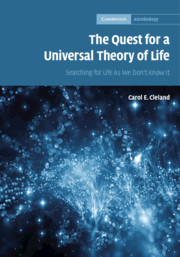Book contents
- The Quest for a Universal Theory of Life
- Reviews
- Cambridge Astrobiology
- The Quest for a Universal Theory of Life
- Copyright page
- Dedication
- Contents
- Acknowledgments
- Introduction
- 1 The Enduring Legacy of Aristotle: The Battle over Life as Self-Organization or (Genetic-Based) Reproduction
- 2 Why Life Cannot Be Defined
- 3 What Is a Scientific Theory?
- 4 How Scientific Theories Develop
- 5 Challenges for a Universal Theory of Life
- 6 Rethinking the Traditional Paradigm for Life: Lessons from the World of Microbes
- 7 Artificial Life: Could ALife Solve the N = 1N=1 Problem?
- 8 Searching for Extraterrestrial Life Without a Definition or Universal Theory of Life
- 9 A Shadow Biosphere: Alien Microbes on Earth?
- Conclusion
- References
- Index
4 - How Scientific Theories Develop
Published online by Cambridge University Press: 05 September 2019
- The Quest for a Universal Theory of Life
- Reviews
- Cambridge Astrobiology
- The Quest for a Universal Theory of Life
- Copyright page
- Dedication
- Contents
- Acknowledgments
- Introduction
- 1 The Enduring Legacy of Aristotle: The Battle over Life as Self-Organization or (Genetic-Based) Reproduction
- 2 Why Life Cannot Be Defined
- 3 What Is a Scientific Theory?
- 4 How Scientific Theories Develop
- 5 Challenges for a Universal Theory of Life
- 6 Rethinking the Traditional Paradigm for Life: Lessons from the World of Microbes
- 7 Artificial Life: Could ALife Solve the N = 1N=1 Problem?
- 8 Searching for Extraterrestrial Life Without a Definition or Universal Theory of Life
- 9 A Shadow Biosphere: Alien Microbes on Earth?
- Conclusion
- References
- Index
Summary
What factors impede the development of successful scientific theories? How can the development of such theories be facilitated? These questions arise independently of which conception of scientific theory one endorses. They are especially important for biology since we currently lack a scientifically fruitful, universal theory of life; as many biologists are fond of admonishing, “give me a general principle of biology and I’ll find an exception.” At best (assuming that life has a universal nature, which is not certain) we are still in the earliest stages of formulating such a theory. For as the next chapter (Chapter 5) explains, recent advances in biochemistry and molecular biology have established that familiar Earth life provides just a single example of life. Biologists have also discovered that complex multicellular eukaryotes are highly specialized, biologically fragile, latecomers to our planet. Yet (as discussed in Chapter 1) the latter, especially animals and plants, have served as prototypes for biology since the time of Aristotle. In a nutshell, in addition to generalizing on the basis of a single example of life, we have been seeking universal principles for life from an unrepresentative subsample of it.
- Type
- Chapter
- Information
- The Quest for a Universal Theory of LifeSearching for Life As We Don't Know It, pp. 82 - 104Publisher: Cambridge University PressPrint publication year: 2019

